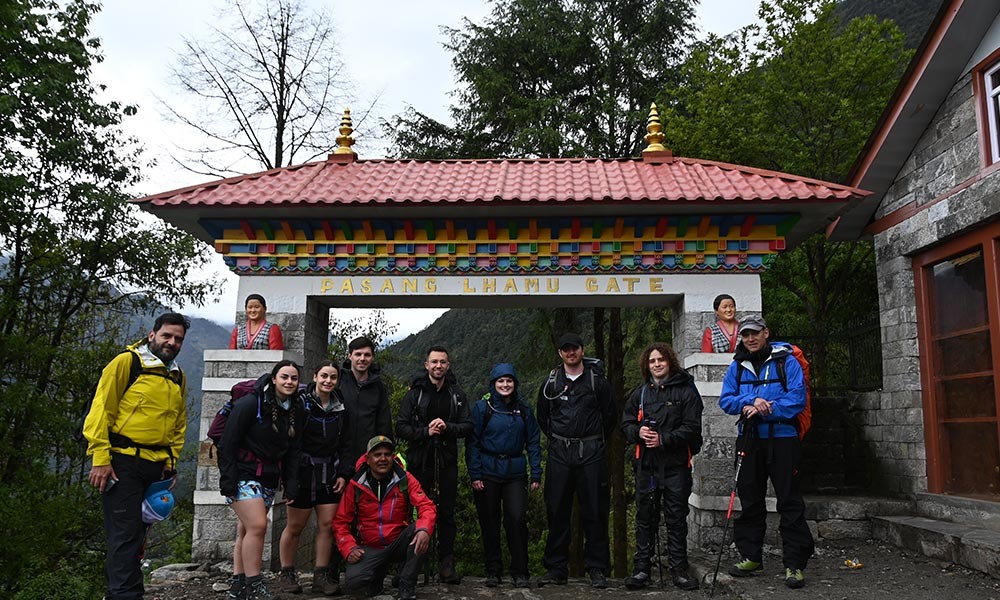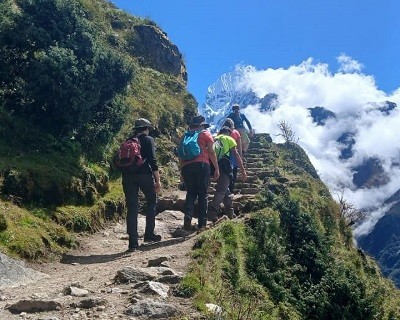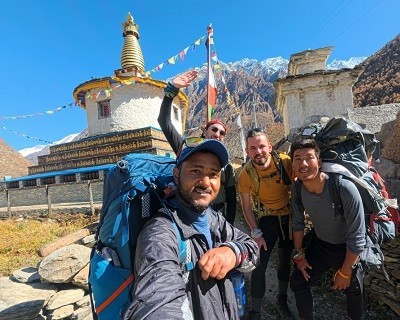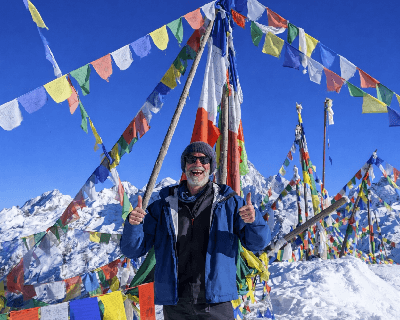Spring (March-May)
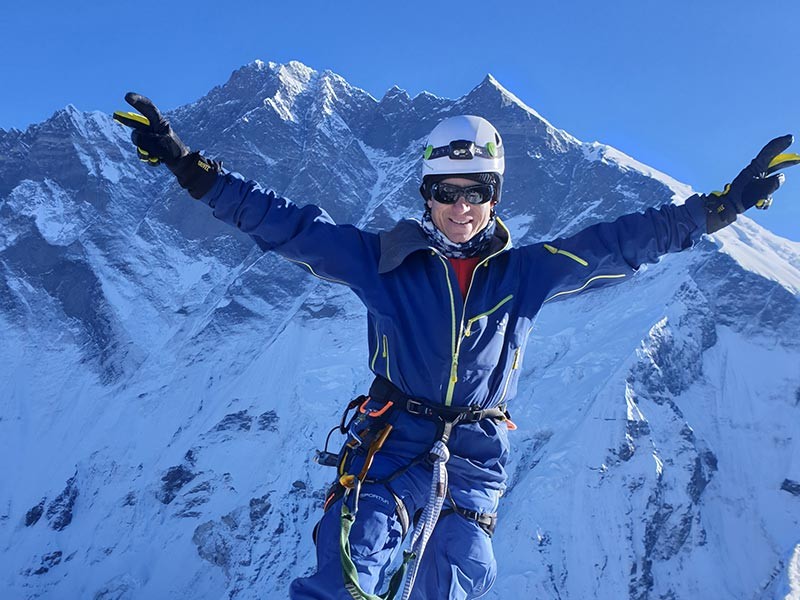
Spring is one of the best time for Everest Base Camp Trek with Island Peak. The beautiful trek is ideal in spring, as it has perfect weather conditions. The weather is stable, with no unpredictable rainfalls ruining the trekking journey.
Trekkers can trek freely without weather-related challenges, like heavy rainfall, snowfall, and other extreme conditions. Another exciting aspect of trekking in the spring is spotting wildlife species that become active after winter. There is lush vegetation all around, with colorful flowers covering the trails.
Spring is thus ideal for trekking and peak climbing adventures in the Everest region. The sweeping views of the entire Everest Mahalangur Himalayas make the trek special. The daytime temperatures remain at a level that is ideal for trekking. The temperatures can drop a few degrees in the nighttime.
Trekkers can trek in a tranquil atmosphere from March to May. There are clear blue skies in the region with outstanding views of the Himalayas. The snow-clad mountains vistas of Mt Everest, Ama Dablam, Mt Cho Oyu, Mt Lhotse, and others are highlights of the trek.
March is the Spring season's first month that comes after the winter season. Therefore, it can be relatively colder, especially early mornings and nights. The weather gets generally warmer as the season progresses in April and May. However, you should avoid traveling in late May as the early monsoon season can bring some rainfall.
Advantages of Spring
- Clear visibility
- Calm weather and pleasant climate
- The ideal temperature for trekking and peak climbing
- Green vegetation and colorful trails
- No heavy precipitation
- Less weather-related challenges
- Trekking with fellow trekkers
Challenges you might face during Spring
- Crowded trails and packed accommodations
Autumn (September-November)
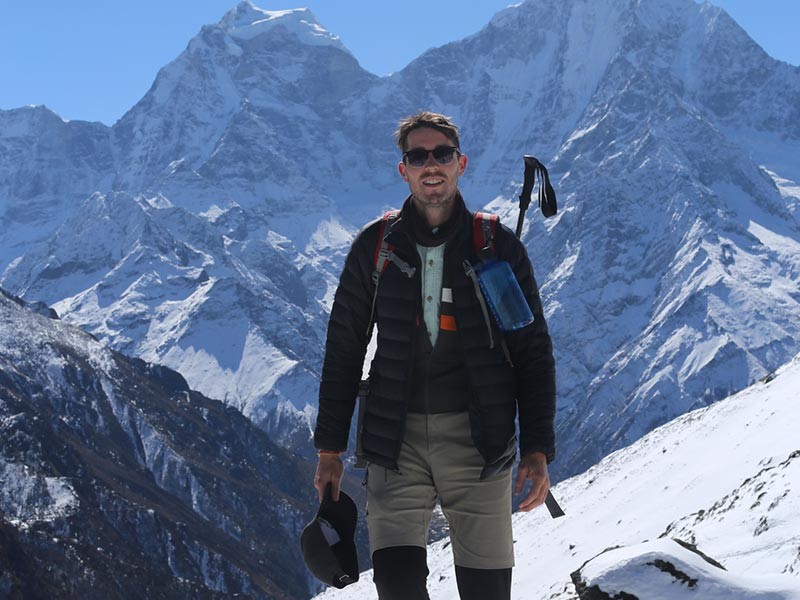
Autumn is widely considered one of the best times for trekking in the Everest region. The beautiful area gets even more spectacular in this season. Weather conditions are stable as there are fewer weather-related challenges like landslides, avalanches, and other. The weather remains clear of heavy precipitation or snowfall.
The Autumn season provides you with sweeping views of the snow-clad mountains. Trekkers can observe these Himalayan landmarks in clear blue skies. The serene Himalayan foothills of the region are pretty safe and comfortable for the trek during this season.
Moreover, various festivals get celebrated in the country during the Autumn season. Hence, trekkers will have the opportunity for cultural exploration on the beautiful cultural trails. You can get more insights into the local settlements with the help of a professional guide.
Moreover, the Everest region's visibility remains clear, allowing you to climb Island Peak early in the morning. As you move higher along the altitude in the trails, the temperatures drop significantly. The temperature will reduce considerably in the latter part of the Autumn season as the winter is quite close.
However, there is some precipitation in the early parts of September, and it gets pretty cold in the latter part of November. Hence, this Everest base camp trek with Island peak is ideal in the middle of the Autumn season.
Advantages of the Autumn
- Perfect weather and climate
- Moderate temperatures throughout
- Safe and comfortable peak climbing experience
- Higher level of visibility
- Less weather-related challenges
- Fewer levels of precipitations
- Clear views of the snow-clad mountains
- The festive atmosphere along the trails
Challenges of Autumn
Off-Seasons Treks (Not Recommended)
The off-season in the Everest region includes the summer-monsoon and winter seasons. These seasons have challenges, including heavy rainfall, heavy snowfall, and extreme frigid weather conditions. There are various weather-related difficulties like landslides, avalanches, erosion, etc.
Trekking in the off-season is quite a difficult journey. However, if you want to trek in a peaceful atmosphere with some added adventure, you can walk in the off-season. However, it is generally not recommended for trekkers due to the risk factors involved. Spring and Autumn are ideal if you want to trek without any hassle. Read more to know about these off seasons:
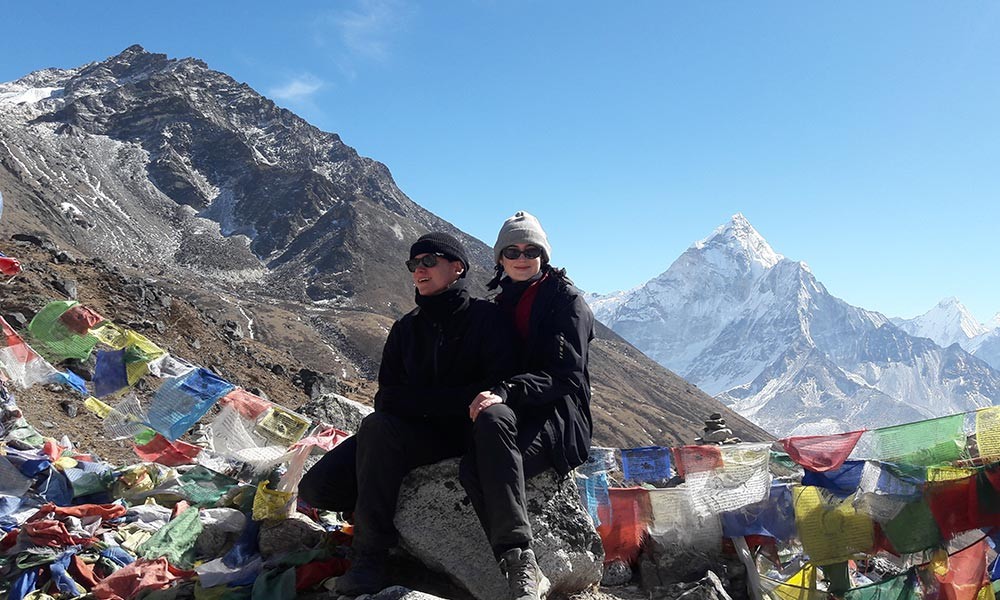
Summer-Monsoon (June-August)
Summer-Monsoon is an off-season for trekking and peak climbing adventures in the region. There are various weather-related challenges that the trekkers will have to face during this season. Clouds are covering the sky with overcast conditions throughout these seasons.
Hot and humid conditions with heavy precipitation ar a highlight during this season, from June to August. July is the wettest month with record precipitation which leads to slippery leech-infested trails. Hence, the Everest base camp trek with Island peak gets quite risky. However, if you want to trek in this off-season, you should choose the latter parts of the season.
Advantages of the Everest Base Camp Trek with Island Peak in Summer-Monsoon
- Quiet trails
- Peaceful atmosphere
- Added adventure
- Budget prices on meals, accommodations, and tickets
Challenges of the Everest Base Camp Trek with Island Peak in Summer-Monsoon
- Heavy rainfall
- Slippery trails
- Leech infested trails
- Weather-related delays
- Low visibility
- Overcast skies
- Added gears
Winter (December-February)
Winter is another off-season in the region with various challenging conditions. There is a beautiful winter atmosphere in the winter season. However, there are various challenges, including extreme cold conditions and heavy snowfall.
December is the first month of the winter season that lasts till February. Some temperatures drop significantly in the peak winter season of January. There are snow storms, with gayle-force winds blowing in the Island peak. Therefore, these are the various challenges of the high-altitude trek in the winter season.
The trails remain covered in thick snow throughout the season. Although not recommended, if you want to experience the winter wonderland, you can trek in this season too. However, you must undergo proper training and preparation and carry added gear for protection.
You may also like:
Advantages of the Everest Base Camp Trek with Island Peak in Winter
- Quiet trails and accommodations
- Bargain prices on packages
- Discounted costs on meals, flights, and accommodations
- Winter Himalayan vista
Challenges of the Everest Base Camp Trek with Island Peak in Winter
- Extreme cold weather conditions
- Heavy snowfall
- Delays and cancellations
- Low visibility
- Extra gear required
For those seeking an additional level of challenge and excitement in their Himalayan adventure, the Everest Three High Passes Trek is a fantastic choice. This trek not only encompasses the traditional Everest Base Camp route but also traverses three of the highest passes in the Everest region, providing stunning vistas and a unique experience of the region's varied landscapes.
